Join Our Newsletter
If you're here, your chicken's safety is your primary concern. By signing up for our monthly newsletter, you can get regular updates on predator-proofing your coop, tips for operating your smart door, and more!
If you're here, your chicken's safety is your primary concern. By signing up for our monthly newsletter, you can get regular updates on predator-proofing your coop, tips for operating your smart door, and more!
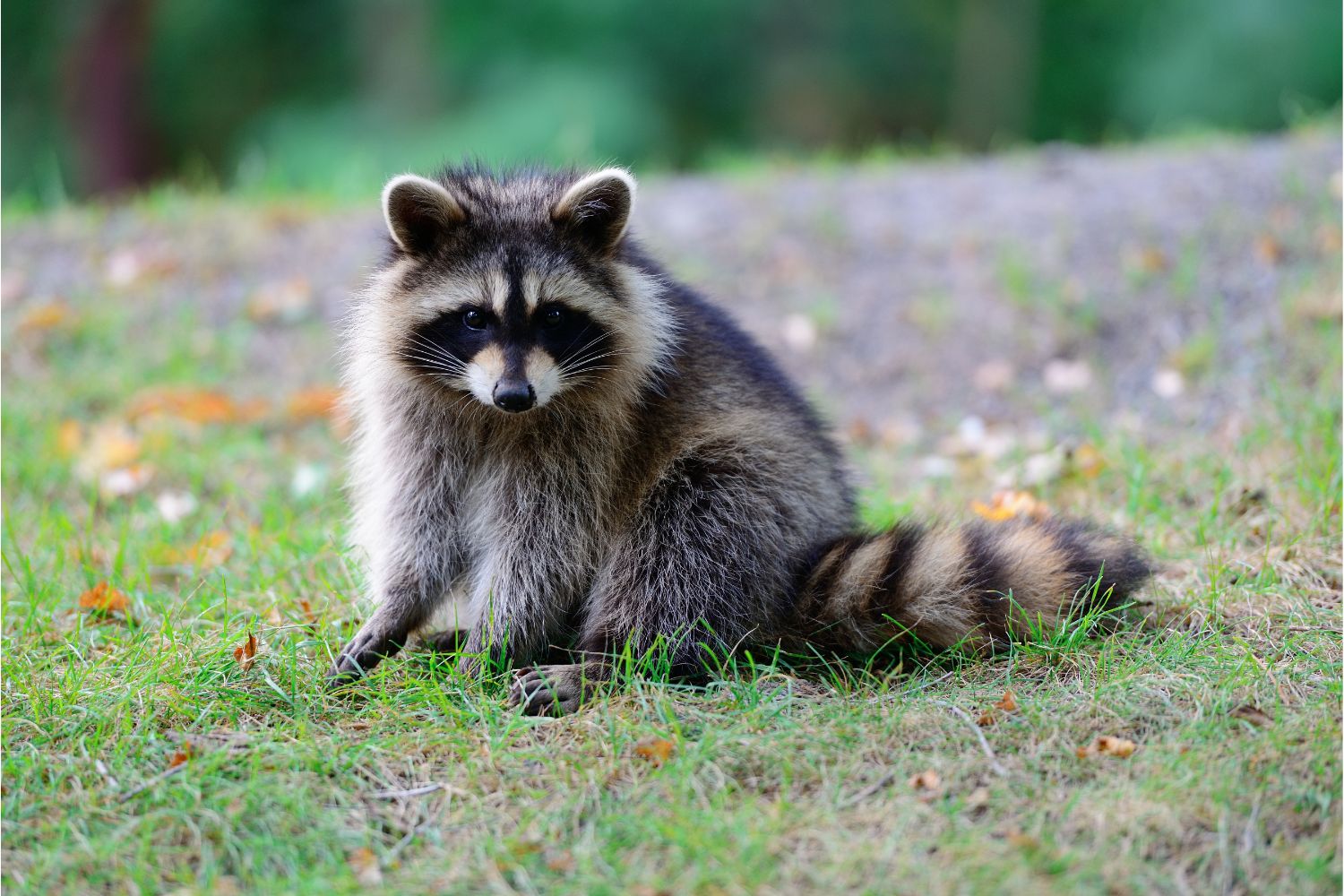

Are you familiar with a certain species of mammals with ringed tails and cute little masks on their faces? Though they may be cute little creatures, they do not act so cute on your property or in your coop. Raccoons are little trash diggers, conniving thieves, and chicken snatchers. When it comes to the safety of your hens, we know you value them as a top priority.
Hens are important to us and provide us with delicious eggs. If someone or something is nabbing our hens, we want to be proactive. These wily little animals could be stealing your hens right under your nose, and decimating your flock. Let’s look at how to keep raccoons away from chickens and give you some additional knowledge about these little creatures.

These sneaky mammals with ringed tails have some characteristics that can make them difficult to catch and trap. Though they only weigh approximately 10-20 pounds and are about 23-38 inches long, these little animals can pose a greater threat than you may think to your chickens. Let’s look at some things you might want to take into consideration as you learn how to keep raccoons away from chickens.
If you want to learn more general information about raccoons and their characteristics, check out this article.

Nocturnal animals are active at night, and raccoons are no different, hunting at night and sleeping during the day. In their active periods of the night, raccoons will hunt, search for water, and socialize. They are very well suited to the dark and have wonderful night vision, acute hearing, and a powerful sense of smell.
Though they are mostly nocturnal, raccoons’ behavior may vary based on a lot of things, including their environment and their relationship with humans. In urban areas, possibly where you live, raccoons may be seen a bit more in the daytime.
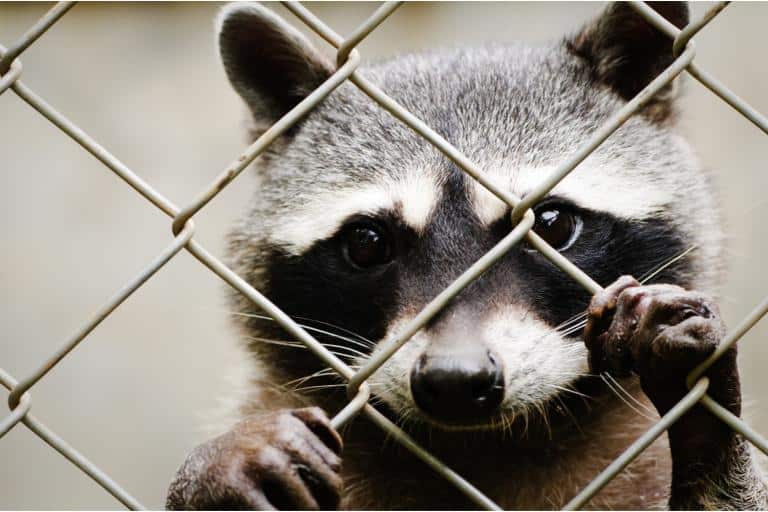
These creatures not only come out at night, when you can’t see them, but they are also considered highly intelligent. There are several reasons why raccoons are considered so.
Raccoons have excellent problem-solving abilities and can use these skills to maneuver into your chicken coop. They can use their tiny paws to manipulate objects (like locks) and figure out complex and confusing food mechanisms that other animals couldn’t solve. These little beasts are not to be trifled with.
Another ability that works in the raccoon’s favor is good memory capabilities. These animals can remember solutions they discovered in a certain situation and use them again in the future. They can remember routes, and locations, and recognize individuals in their social group. If they have opened a lock similar to the one you have, chances are they will remember how to unlock yours as well.
Raccoons are adaptable in multiple ways. First of all, they are adaptable in their diet, meaning they eat a large range of foods. Raccoons can eat fruits, nuts, small animals, insects, and other things. They are very adaptable in their habitat too, thriving in forest regions, wetlands, grasslands, and urban areas.

Hearing that in addition to all their skills and smarts, raccoons are also great climbers is probably not going to be music to your ears. These little animals have been blessed with agile little bodies that are flexible and sharp little claws that can retract and extend when necessary to grip onto surfaces. Their coordination and strength are also essential in making them good climbers.
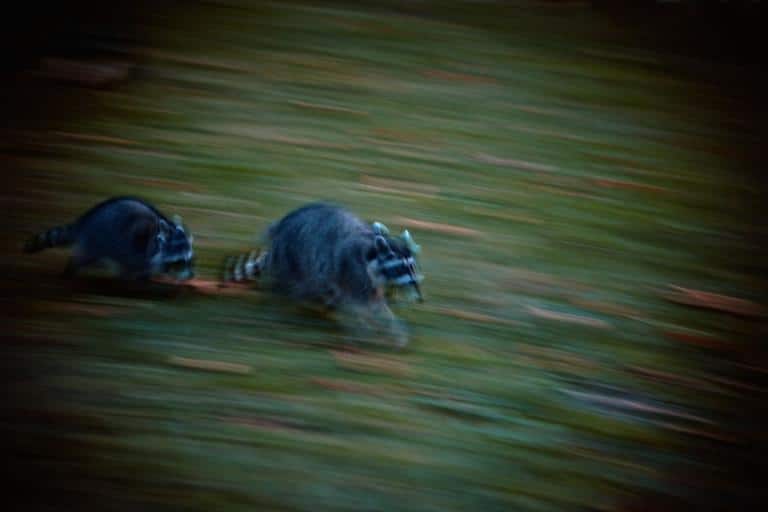
Now that you know a bit more about who you are dealing with, and what their capabilities are, let’s look at some practical tips and learn how to keep raccoons away from chickens using deterrents.
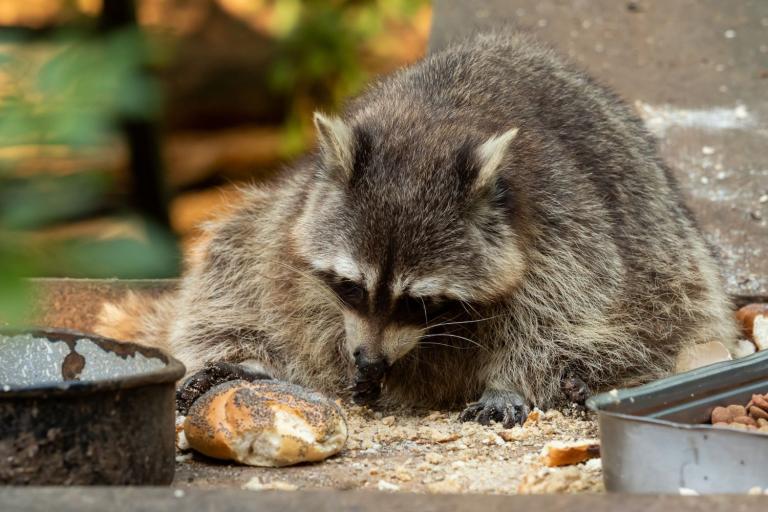
The first thing to think about when learning how to keep raccoons away from chickens is how many food sources you have on the premises. Raccoons love to scavenge for food and will keep coming back to your house as long as they are getting what they want.
Do you have trash bins that are easy to open? Are trash bags lying around? Is rotting fruit falling from fruit trees? How about slop or other types of leftover food you might be throwing into the chicken pen? Consider the amount of food sources you have on the property and find ways to limit or eliminate them. Don’t give the raccoons any reason to want to visit your house.

Sometimes simple things like deterrents on your property may help keep raccoons away from your coop. If you can leave a bad taste in their mouths, hopefully, they will want to steer clear of you and your hens. Consider some of the following deterrents to keep them away. Detterents are a great method to utilize when learning how to keep raccoons away from chickens.
Raccoons like to move stealthily in the dark, so if you can install bright motion sensor lights, it may scare them off. Motion-activated sprinklers may work as well to spook raccoons and help them avoid your coop.
No one likes to be scared by loud noises, including raccoons. Install deterrents near the coop that give off a predator call or try something as simple as wind chimes. Maybe consider Ultrasonic raccoon repellent. These repellents make noises that are even outside of the human range of hearing, meaning it won’t bother you, though it may drive them crazy.
Another way to possibly learn how to keep raccoons away from chickens is bad scents. At least scents that are bad for their noses. Soak rags or cotton balls in the scent you choose, and place them strategically on the property. At the base of trees, trash bins, around the pen, and wherever you think raccoons may be visiting. You can also use a spray bottle. Raccoons have a heightened sense of smell, and scent repellents like the following may do their job well:
Beware of course, that you might want to consider using smells that don’t reek too much, at least to a human standpoint. You don’t want to have to deal with foul smells on your property.
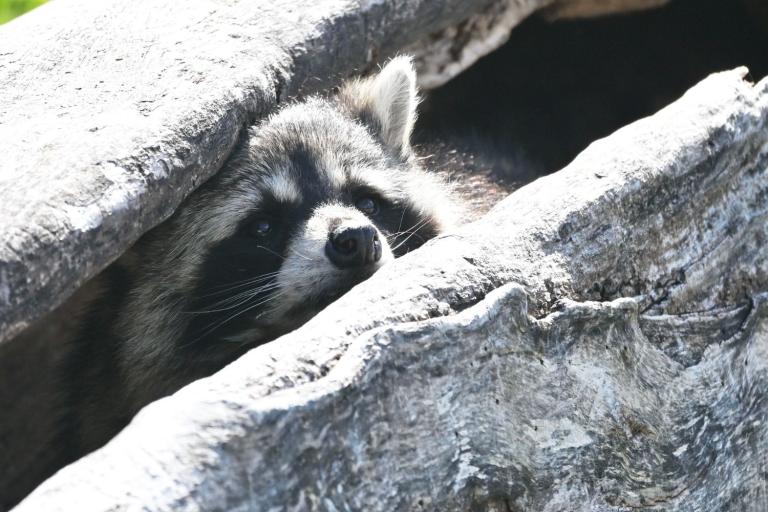
If you want to effectively learn how to keep raccoons away from chickens, then first consider places they could be hiding. If you want to keep raccoons at bay on your property, it is a good idea to remove potential hiding spots.
Raccoons don’t like to be out in the open; they prefer to stay tucked behind trash bins, trees, and other objects. They will tend to seek out sheltered areas like piles of brush or stacked firewood. Clean up debris on your property and try trimming the vegetation on your land, whether it be tree branches, shrubs, or anything that provides them with a place to hide out, or climb up.
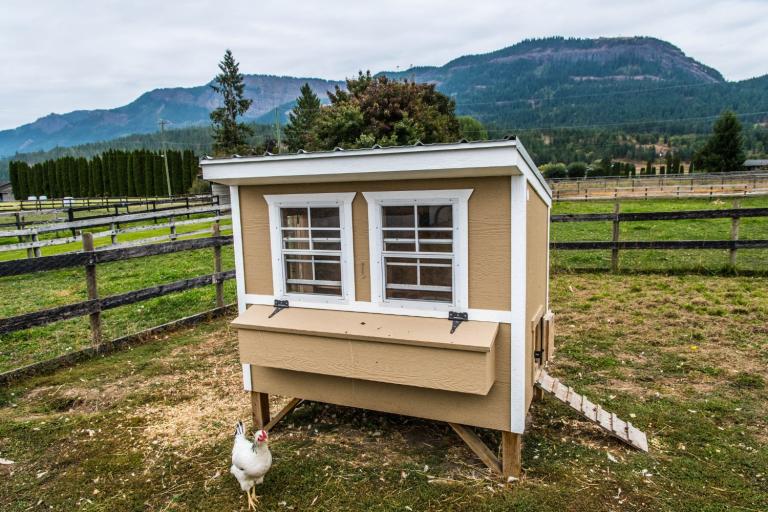
Though you may use all the deterrents we suggested, it is not guaranteed that these nasty little rascals will stay away from your coop. The most important thing you can do if you want to learn how to keep raccoons away from chickens is to truly raccoon-proof your coop. Let’s look at a few ways we can do that.
Need coops for your chickens that will be predator-proof and customizable to your needs? Check out The Hen House Collection and their coops!
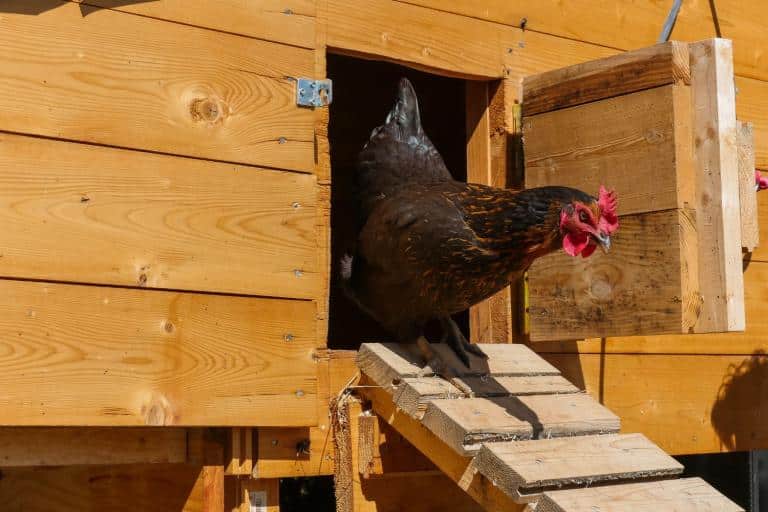
We discussed earlier that raccoons are very smart and good with their paws. If you want to protect your hens from a persistent raccoon, then you should take a good look at the doors in your coop. Are the doors to the chicken run opened and closed with a simple latch? Is the door simply a wood frame with netting? Don’t underestimate raccoons. They may break into a door that you truly believed was predator-proof. Consider these tips to create a strong raccoon-proof door and learn how to keep raccoons away from chickens. Building strong doors is also important if you want to learn how to foxproof a chicken coop.
How sturdy is your door? Make sure your door is constructed with strong wood or metal that a raccoon cannot break down or manipulate. Be sure to lock the coop door using strong, heavy latches that raccoons cannot easily open, like barrel bolt locks, or padlocks, especially overnight. Having strong sturdy coop doors will go a long way in bear-proofing your coop as well.
Hardwire cloth is a strong, durable wire mesh with small openings. Attach this wire with screws or staples to the run door or coop door. Any flimsier wire could easily be pushed through or broken down by a raccoon.
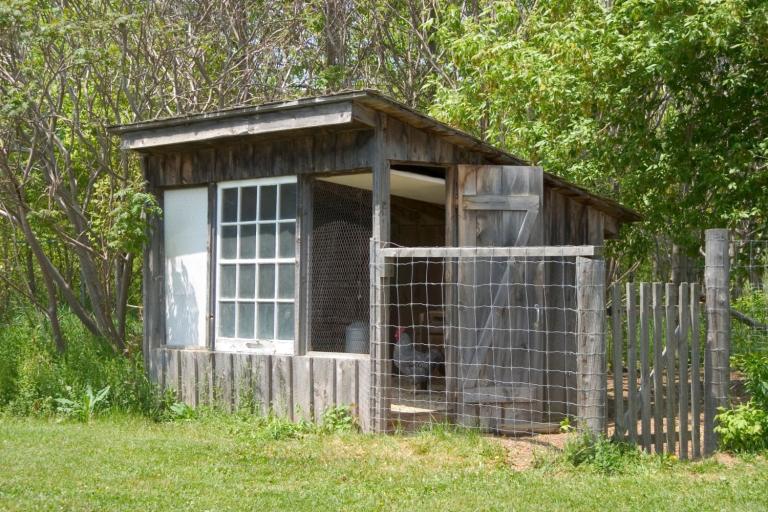
Raccoons are sneaky little animals, and their small size will help them in this case. They can slide through small cracks and maneuver into spaces that you would not guess they could get into. You must seal off any possible holes or entrances that could allow a raccoon in. Use hard-wire to cover windows and seal off sections of the coop that would be vulnerable to attack. Check for areas in your coop and run that could be allowing raccoon access to your hens.
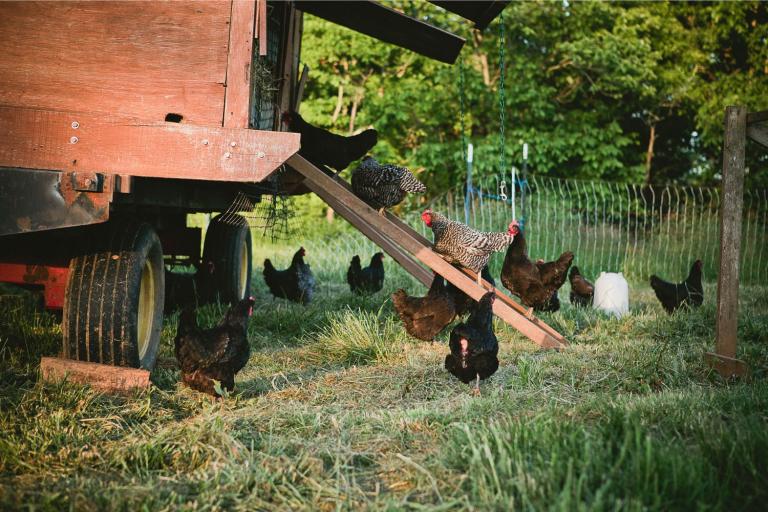
Raccoons prefer easy access to their food, so a coop that is further off the ground may discourage them, and send them looking elsewhere for an easier target. Every little thing you can do to keep raccoons looking somewhere else will help protect your flock.
Raising the coop floor may be used with other security measures, like adding a layer of hard-wire mesh to the bottom of the coop or reinforcing the flooring. Raccoons will not be able to burrow under the ground into the coop if the coop is raised and the bottom is properly reinforced.

Like predator-proofing your coop for any animal, whether it be a dog, hawk, or snake, it is important to use sturdy materials. Let’s look at some ways you can use solid materials to reinforce the security of your coop.
Make sure your coop is constructed from solid wood, plywood, or metal sheets and not simply flimsy wiring. It is important that if you have a run, it is secure and does not leave your chickens out for the taking. Be sure to mesh materials together so a raccoon cannot pry them apart. Be proactive! Don’t assume a raccoon can’t get in because he might surprise you.
Make sure the windows in your coop are sturdy and not easy to pry open. Below are some steps to ensure your windows are raccoon-proof.
Check out this article for a full list of essentials for your chicken coop.

A great way to ensure that your chicken coop is secure is to use a strong door that cannot be easily compromised. Something simple like a swinging coop door may be easy access for a raccoon once he makes it into the chicken run. An automatic coop door from Pet Auto Door would be the perfect solution to your coop door problems. These automatic doors can be opened and closed at the time you set, and are built with heavy-duty metal, ensuring that NO predator is gaining access to the coop.
Not only is the Pet Auto Door extremely safe for your hens, but it is also convenient for you. You can set your door to open in the morning and not worry about climbing out of bed to let your hens out of the coop. The doors come with multiple power options so you can select the one that’s best for you. We even offer solar panels for a solar-powered chicken coop door!
We hope you learned some valuable information about how to keep raccoons away from chickens. Check out this article for a complete guide to hawk-proofing your coop!